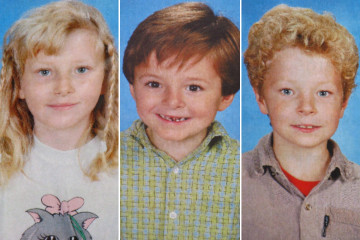

Kaitlynne Schoenborn, 10; Max Schoenborn, 8; and Cordon Schoenborn, 5, are shown in a composite image taken from framed picture at the memorial wall in Merritt, B.C on Thursday April 10, 2008. Terry Theodore/THE CANADIAN PRESS
Terri Theodore
Kamloops, B.C. — The Canadian Press Published on Friday, Nov. 27, 2009 6:41PM EST
Dr. Roy O'Shaughnessy testified that Allan Schoenborn believed his children were being sexually abused, and felt the only solution was to kill them.
“The distortions in the thinking led him to believe – I think probably at a moment's notice at the time of their deaths – that the only way to protect them was in fact to kill them and put them in heaven,” the psychiatrist testified.
“In his disillusioned view of the world it was logical.”
Mr. Schoenborn has pleaded not guilty to three counts of first-degree murder.
The bodies of 10-year-old Kaitlynne, eight-year-old Max and five-year-old Cordon were discovered in their Merritt, B.C., trailer home on April 6, 2008.
Dr. O'Shaughnessy told B.C. Supreme Court that Mr. Schoenborn's actions leading up the murders clearly show he was in a psychotic state. He'd had several run-ins with the law and a confrontation at his children's school in the days prior to the deaths.
And Dr. O'Shaughnessy, a witness for Mr. Schoenborn's defence, said there's evidence dating back a decade that the father of three had a chronic mental disorder.
“He was not in his right mind,” Dr. O'Shaughnessy said in a Kamloops, B.C., courtroom. “I think he's been in a psychotic state for some time.”
Dr. O'Shaughnessey concluded Mr. Schoenborn either had a delusional disorder or schizophrenia, and had been mentally ill for some time. But Mr. Schoenborn often played down his illness and self-medicated with alcohol, the psychiatrist told the judge, who is hearing the case without a jury.
Defence lawyer Peter Wilson asked the doctor to sum up his diagnosis of Mr. Schoenborn on the day he killed the children.
“He was suffering a major mental illness, he was psychotic, not able to judge events rationally. He was under delusional beliefs ... certainly his behaviour, well it was just catastrophic,” the psychiatrist testified.
Mr. Schoenborn, who was clean-shaven and whose head was nearly shaved at the time of his arrest, has let his hair and beard grow out to below his shoulders.
He kept his eyes on the floor during most of the testimony, looking at times as if he were sleeping. At other times he appeared interested in the proceedings.
In his own earlier testimony, a sobbing Mr. Schoenborn described to the court how he stabbed his daughter to death and then suffocated his two sons after spending the day flying kites with them. Their mother, Mr. Schoenborn's estranged spouse Darcie Clarke, was not home.
In one chilling exchange, Mr. Schoenborn described for the court how Kaitlynne fought back as he slashed at her neck with a cleaver, and pleaded with him to forgive her.
He told the court he loved his children and that's why he killed them, because he was certain they were being sexually abused and no one would help. There has been no evidence at the trial that the children were being molested.
Mr. Schoenborn has also testified that he believed the children's mother cheated on him repeatedly and he questioned whether their youngest child was even his. The Crown contends revenge was the motive for the murders.
But Dr. O'Shaughnessy said the case does not fit the profile of a parent who commits filicide for spousal revenge.
“They are never mentally ill,” he said of such parents. “They are always nasty people.”
The 41-year-old former Vancouver roofer was found dehydrated, wandering in the woods with self-inflicted wounds to his wrists after a 10-day manhunt.
The court also heard Friday that just days before the deaths, the children's mother was warned by a government official to protect the kids.
In a new statement submitted to the court, Ms. Clarke said that the official with the Ministry of Children and Families warned her that if she wasn't taking appropriate steps to protect her children, then the ministry would step in.
The official made the statement at the children's school hours after Mr. Schoenborn threatened one of Kaitlynne's schoolmates.
In the statement, Ms. Clarke said that earlier that day, she'd gone to the ministry to have an order lifted that forced her and Mr. Schoenborn to see their children separately.
In another statement submitted to the court, two RCMP undercover officers said they spent five days with Mr. Schoenborn in cells at the Kamloops Regional Correctional Centre. The names of the officers are protected by a publication ban.
Justice Robert Powers heard that the two officers were housed with Mr. Schoenborn in a special observation unit at the prison, where they engaged him in recorded conversations trying to elicit information.
In one of the chats, an officer told Mr. Schoenborn he did not judge him for what happened, adding that he was “a good dad.”
“Well, I try. I miss them a lot,” said Mr. Schoenborn.
On another day, Mr. Schoenborn tells the officers that he meant to do what he did.
Commentary by the Ottawa Mens Centre
"nasty people" fill family court, they are generally "suffering" a severe personality disorder and or a mental health problem.
These are problems that are almost taboo subjects in Canada. The government simply does not wish to ever admit the problem is there and does everything it can to get rid of anyone who brings it to their attention.
While society fails to recognize the seriousness and the long term harm that results from the failure of society to recognize these problems our family courts and, criminal courts will continue to be swamped with the effects about which the causes are rarely ever addressed.